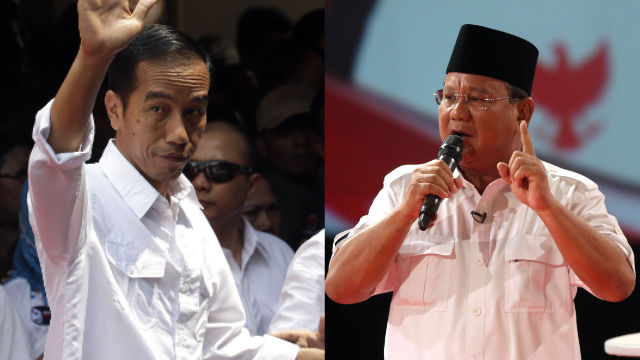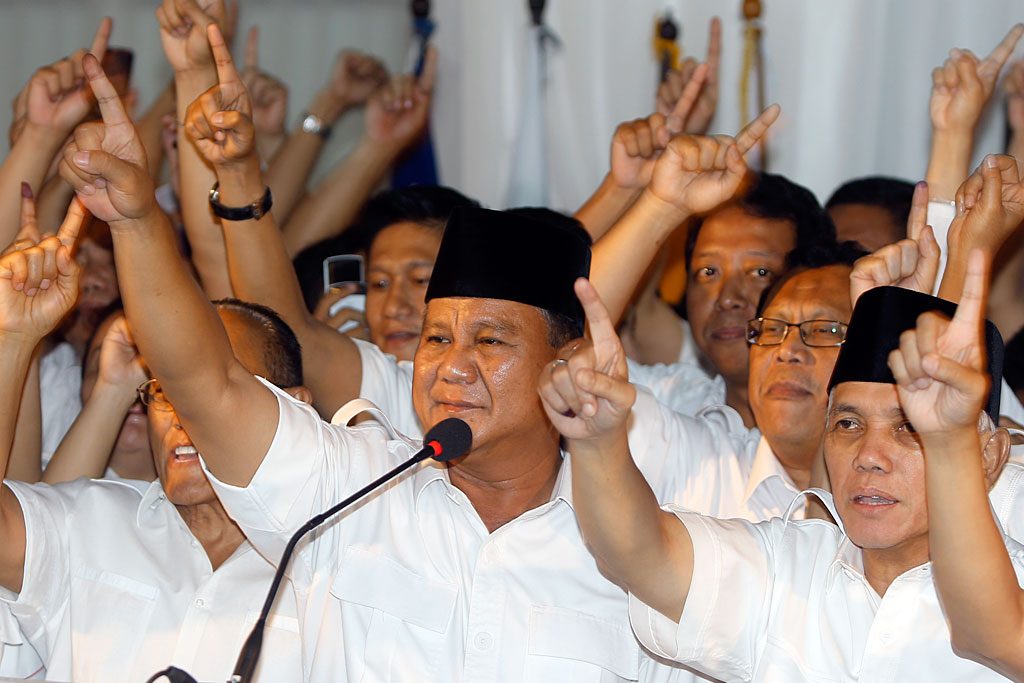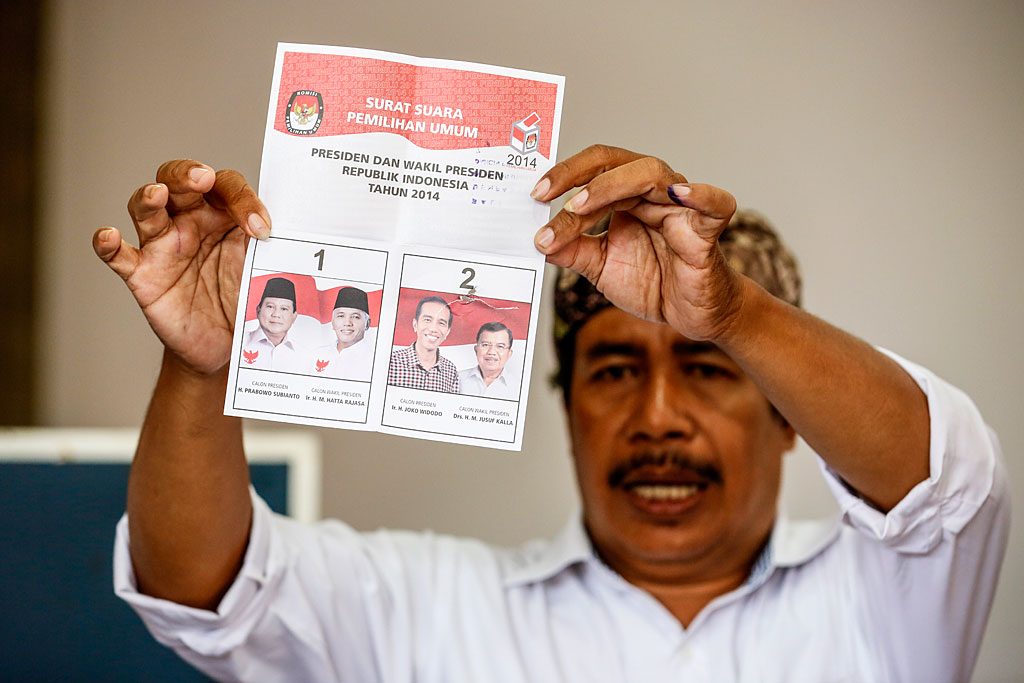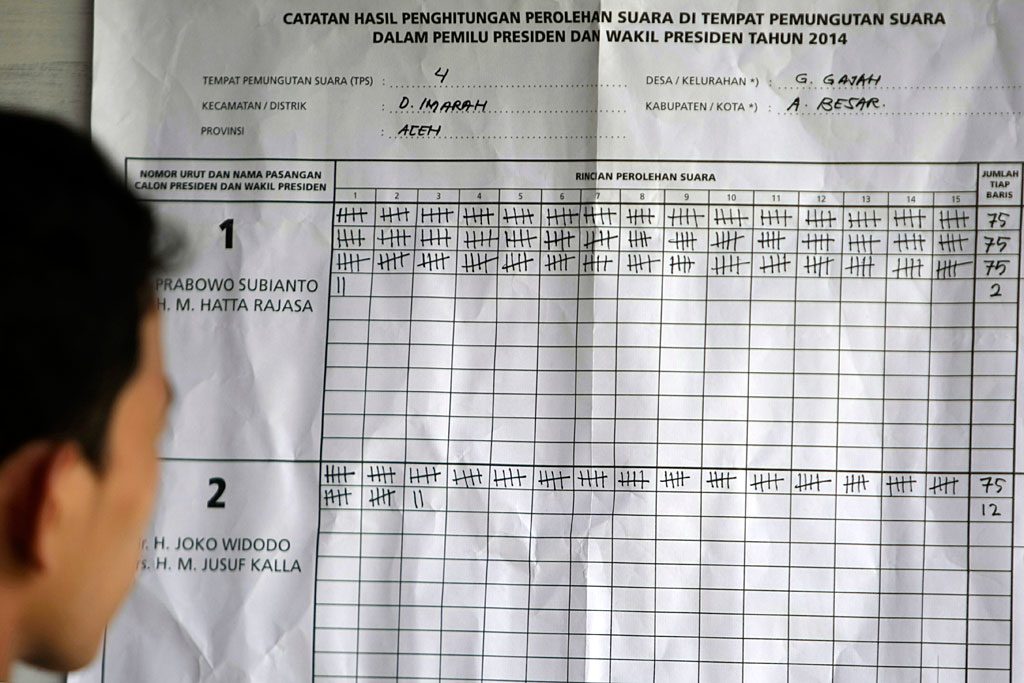SUMMARY
This is AI generated summarization, which may have errors. For context, always refer to the full article.

JAKARTA, Indonesia – After almost two tense weeks, Indonesia will find out on Tuesday, July 22, who their next president is. Both camps have remained steadfast on their victory claims since the election on July 9, but the evidence so far points to an announcement in favor of Jakarta Governor Joko “Jokowi” Widodo and Jusuf Kalla.
Let’s set aside the claims of fraud and manipulation from both camps, the warnings that a win for former general Prabowo Subianto would mean Jokowi was cheated, and just look at the evidence.
Who really won?
To start with, the quick counts held by Indonesia’s credible pollsters all found Jokowi and Kalla to have won by a margin of about 5 percentage points – a difference of about 6.5 million votes. Their rivals, Prabowo and Hatta Rajasa, first tried to discredit those pollsters by showing results from other quick counts that showed them winning. However, when criticism of the pollsters the Prabowo camp relied on piled up – particularly their lack of credible track record, and later their refusal to be audited – they said “look at our quick counts” less and repeated the “we should look at the real count” line more. (READ: Persepi expels Puskaptis, JSI)

On Tuesday, July 15, almost a week after the election and amid the audits of the quick counts, a Prabowo media person told me: “Why is everyone still so focused on quick counts? Why aren’t they asking about the real count?” That same day, Prabowo’s camp issued a press release stating their monitoring of the real count showed Prabowo and Hatta leading with 52.3%.
While the victory claim made by Jokowi’s camp based on the quick counts on July 9 was perhaps premature, that does not mean they should be completely ignored. In the flood of debate and commentary that has since been made on the reliability of quick counts, two arguments are worth highlighting. One, quick counts in Indonesia – particularly the ones carried out by pollsters who said Jokowi won – have generally been trusted until this extremely divisive election. And two, quick counts are important to guard against electoral fraud. How else will the Indonesian people know whether the real count is correct? That there was no fraud or manipulation in the recapitulation by the General Election Commission (KPU)?
Parallel counts
For the sake of argument, let’s ignore the quick counts who showed Jokowi won, as Prabowo’s camp says they were mostly run by people who support his rival. Two privately initiated and volunteer-based parallel counts of the actual 130-million-plus votes cast – Kawal Pemilu and Kawal Suara – are coming up with numbers strikingly similar to the quick counts. The numbers have been pretty consistent at around 52-53% for Jokowi and Kalla, and 47-48% for Prabowo and Hatta. (READ: ‘Crowd-counting’ Indonesia’s votes)
Could 7 separate quick counts and 2 parallel counts of actual votes all be wrong and be part of a grand scheme to steal the election? Gerindra party’s media center head Ariseno Ridhwan told a Rappler writer he was wary of the “so-called quick counts and real counts that have obviously sided with the other camp.” So let’s assume the answer to this question is yes.
Why then would both these parallel count websites be targeted by hackers? One can easily come up with quick theories as to why they were attacked. Unless, of course, we consider again the possibility that the hacks were just part of an elaborate scheme to falsely show that the Prabowo camp is attempting to manipulate the results. (READ: 2 parallel vote count sites attacked)
All this leaves us with two scenarios to choose from: one where Jokowi really did win the election, and another where Jokowi – who was only declared a candidate less than 4 months before the election, and who at the time had a massive lead over everyone else – has been able to plan and execute well a grand elaborate scheme to subvert the will of the Indonesian people.
It’s easier to believe the first one.

July 22 scenarios
Regardless of who the KPU announces on Tuesday, it’s pretty certain now that a legal challenge will be filed with the Constitutional Court. Prabowo has repeatedly said: “I am committed to respecting the final decision of the KPU on July 22, whatever it is, if it is the right decision and through a fair and transparent process.” That last clause contains a big “if”.
There have been allegations of electoral fraud on both sides, which obviously will be used as basis for a review of KPU’s declaration. To be fair, it’s likely that there has indeed been fraud or manipulation on both sides, but the reports we’ve seen so far don’t indicate a scale massive enough to significantly affect the outcome of the election. (Read: Poll fraud allegations circulate online)
There have been worries that a legal challenge will lead to many more months of uncertainty until the Constitutional Court issues a verdict. But given the evidence in favor of Jokowi so far, a KPU declaration of his victory on Tuesday should serve as a good enough assurance for investors. It would be incredibly difficult to prove that 7 quick counts, 2 parallel real counts, and the KPU’s own count were all manipulated by a Jokowi campaign that many – including those who support him – have criticized to be chaotic and disorganized. (READ: Notes on the chaotic Jokowi campaign)
If the unexpected happens – that Prabowo is declared the winner – analysts expect Indonesians to go out on the streets and protest. The reverse – that violence will ensue if Jokowi is declared the winner – is actually seen as less likely to happen.

Marcus Mietzner, an associate professor at the Australian National University who researches Indonesian politics, explains why: “You have very different structures within the two camps in terms of support. Jokowi has a very genuine grassroots support, people who are supporting him have not been paid, people are outside organized networks or groups that are run by elites on the ground. On the other hand, Prabowo has a very well-oiled and very well-funded machine on the ground, but these are not really enthusiastic Prabowo supporters, these are people who are doing it for pragmatic reasons. So I believe the outbreak of the feeling of protest that this election was stolen will be much stronger on the Jokowi side should the electoral commission go against him, than on the Prabowo side.”
Evidence also shows some of the political parties supporting Prabowo are preparing to jump ship in case Jokowi is announced on Tuesday. While this may not automatically mean they already believe Jokowi won, it shows at the very least that they have doubts Prabowo did. (READ: Prabowo’s ‘permanent coalition’ looking tenuous)
Now if Prabowo is indeed declared the winner, and Jokowi’s camp files a legal challenge, Mietzner again says there is greater likelihood the court will side with Jokowi. “The Prabowo camp would not have what the Jokowi camp has, and that is the reference to credible quick counts that show that they have won the election,” Mietzner said.
So even if the KPU declares Prabowo the winner on Tuesday, chances are the court will eventually overturn the decision. (WATCH: #INDOvote: The new dream)
The stage is set for the official announcement on July 22. – Rappler.com
Add a comment
How does this make you feel?
There are no comments yet. Add your comment to start the conversation.